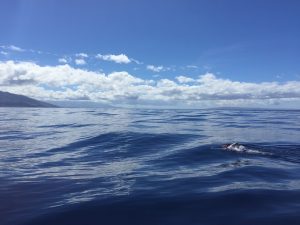 Within DES, Tesla studies clusters of galaxies. Clusters are the largest collapsed objects in our universe, and they form only in the densest regions. The number of clusters which form over time depends on the balance between the gravitational pull of mass in the universe and the expansion history, currently dominated by dark energy.
Within DES, Tesla studies clusters of galaxies. Clusters are the largest collapsed objects in our universe, and they form only in the densest regions. The number of clusters which form over time depends on the balance between the gravitational pull of mass in the universe and the expansion history, currently dominated by dark energy.
She is also interested in the nature of dark matter and using observations of galaxies and clusters to test dark matter models. Her other roles in DES include acting as one of the DES Ombudspeople and chairing the committee which organizes DES collaboration meetings.
We asked Tesla a few more questions — here’s what she had to say:
What motivates / inspires you?
One of the aspects that drew me to science was the idea of always getting to learn new things. Of course, this also makes it challenging. You never really get to the end of a project where you understand everything.
Since I was little I have always been enthralled with space and questions of what was out there, so that motivated my choice of astrophysics. At some point in school I had to write and essay on “If you were a scientist and could study one question, what would it be?” I wrote that I wanted to know if the universe was infinite. These days I enjoy the times when I get to really dig into the data.
Do you have any hobbies or play any sports?
I swim. I was a competitive swimmer as a kid, and after many years of not swimming I got back in to it when I moved to Santa Cruz. In California there are a lot of great open water swim races, and there is a good Masters team here. Swimming can be very cathartic, and I find that is great to challenge myself and set goals in something other than my career. Most recently I swam 11.5 miles from the island of Lanai to the island of Maui, which was by far the longest swim I have done.
What is your secret talent?
I am an excellent four-leaf clover finder. I like to think this means I am a natural observer, but really I think it just means I am persistent.
Do you have kids? Do they want to be scientists too?
Yes, I have two boys ages 4 and 6. It is a little too early to know what they will want to be, but my six year old has recently gotten very interested in astronomy and asks a ton of questions (about everything). One of my favorite recent conversations was about black holes. He wanted to know how long it would take a black hole to suck up a whole galaxy. I tried to explain to him that even though they are very massive, black holes in galaxies only suck up stuff from a small region of space. He said “but it would suck up a star, get bigger, then suck up another star …” I said “Alex, it is not like the black hole has a rocket engine and can go flying around sucking things up.” He thought that was pretty hilarious, black holes with rocket engines.
What do you think has been the most exciting advance in science / technology in the last 10 years?
The detection of gravitational waves!
Any advice for aspiring scientists?
Find what you love and work hard at it, not just in science. Having a career does not need to come at the expense of other aspects of your life.
 Within DES, Tesla studies clusters of galaxies. Clusters are the largest collapsed objects in our universe, and they form only in the densest regions. The number of clusters which form over time depends on the balance between the gravitational pull of mass in the universe and the expansion history, currently dominated by dark energy.
Within DES, Tesla studies clusters of galaxies. Clusters are the largest collapsed objects in our universe, and they form only in the densest regions. The number of clusters which form over time depends on the balance between the gravitational pull of mass in the universe and the expansion history, currently dominated by dark energy.